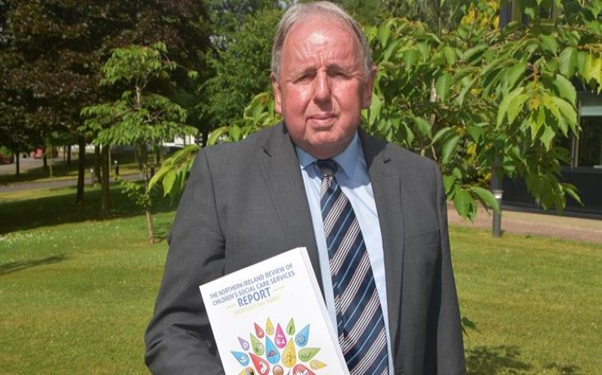
By Ray Jones
The Children’s Wellbeing and Schools Bill is currently being debated within Parliament and, at the same time, the Department for Education (DfE) is consulting on its proposals for new post-qualifying standards for children and family social workers and an accompanying induction programme. There are significant implications from both for children and families and for social workers. They ought to be a concern.
The bill proposes the mandatory creation of separate multi-professional child protection teams. This ignores the reality that children who might need protecting are within a fluid continuum of children in need. With more than 85% of child protection plans being generated by concerns about neglect and emotional abuse, the actions to be taken need to be integrated within family support services and not parcelled off to separate, segregated and centralised child protection teams.
The potential impact of multi-agency child protection teams
This runs counter to the parallel emphasis on relationship-based social work and contextual safeguarding. What instead is to be created is the disjunction, disruption and duplication of child protection social workers parachuted in to do section 47 investigations, to set and oversee child protection plans and, presumably, to initiate and lead care proceedings.
This would be even more threatening for families than current arrangements and undermine other social workers, who will be directed by these peers. It will also result in crucial decisions being taken by child protection social workers who know the children and families less well and who have no continuing longer-term commitment to, or contact with, the families.
Along with the introduction of mandatory reporting of child sexual abuse, this is likely to further increase the number of child protection investigations. The only way for other workers and agencies to be able to get the attention and insurance cover of these child protection social workers and teams will be to talk up concerns about children.
Children at greatest risk ‘will be lost’
As a result, children at greatest risk will be lost within escalating child protection workloads, and increased resource will be taken up in child protection activity, with less help and more threat for families, contrary to the aims of the reform agenda.
None of this is much of a surprise. It follows the setting up, in 2013, of Frontline as a fast-track training programme for ‘child protection’ social workers promised fast promotions and higher perceived status; the primacy given to exceptional high-profile cases in recent policy development; and the DfE’s track record of significant funding for the Signs of Safety practice model.
Although ‘strengths-based’, Signs of Safety is, as the title on the tin suggests, focused on child protection rather than family support for children in need, amidst increasingly prevalent and severe poverty and insecurity and public service cuts.
Proposed induction scheme ‘will generate bureaucracy’
And the proposed children’s social worker induction and assessment programme currently out for consultation again fits within the narrative. It envisages that, after the two-year induction period, social workers will be able to go on to specialise in child protection practice
The proposed two-year post-qualifying induction, training and assessment process for social workers joining local authority children’s social services is much too complex. I counted 399 different standards against which social workers would be assessed.
Whilst the government states it wants social workers to spend a greater proportion of their time in direct contact with children and families, the assessment against the proposed standards will generate its own bureaucracy, and take practitioners away from the front line. Agencies will struggle to give social workers the time or support they need, and what may well happen is that lip service will be paid to the process, but with the ambitions set within these proposals watered down.
And there are major workforce issues from what is proposed.
Exacerbating recruitment and retention problems
A further two years of more intensive assessment beyond qualifying as a social worker is likely to be a deterrent for those who might have thought of employment within local authority children’s services, increasing recruitment difficulties. Why take this on when there are other settings in which to work as a newly qualified social worker without the jeopardy of the proposed assessment and the additional workload and time burdens it will involve?
Having completed the two-year programme, there is no award of an additional nationally-recognised qualification (as there was with the former post-qualifying and advanced social work awards) and no expectation of a career grade enhancement. That is to be left to the discretion of each cash-strapped local authority. It is hard to see, therefore, why the proposed PQ standards and assessment will promote retention.
What it is likely to do is to severely hinder career mobility, and this will especially impinge on local authority children’s services. The likelihood is that, in future, a social worker with considerable experience in adult services, Cafcass or the voluntary sector, or whose experience has been within Wales, Scotland, Northern Ireland or elsewhere, will not have undertaken the two-years programme to be required of England’s local authority children’s social workers. This may provide a barrier to them securing work as experienced practitioners within local authority children’s services.
And the proposed induction, training and assessment will be a cost and resource requirement for local authority children’s services, not for other social work employers, with experienced staff taken away from direct social work practice and its immediate management to implement and sustain the processes proposed.
Lessons from scrapped NAAS scheme ‘not learned’
The DfE has not learnt the lessons of history, including the scrapping of what was the previously proposed National Assessment and Accreditation Scheme for local authority children’s social workers , which had all the concerns noted above.
It also ignores the much welcomed Professional Capabilities Framework, developed more collectively and collaboratively by the social work profession following the work of the Social Work Task Force and Social Work Reform Board, from 2009-10.
And it seems to have forgotten the strengths of the 1990s post-qualifying training, education, and qualifications pathways, which were nationally recognised and which applied to all social workers, albeit with the opportunity for specialist career development and progression.
The experience of the past suggests that it is wise to watch out for the unintended consequences of changes in policy and practice. This experience is likely to be especially relevant to the intention to create separate child protection social workers and the proposed induction and assessment process for practitioners in local authority children’s services.
Ray Jones is emeritus professor of social work at Kingston University and has over five decades’ experience in social work. He is the author of ‘A History of the Personal Social Services in England: Feast, Famine and the Future’ (Palgrave Macmillan 2020) and, in 2022, undertook the Independent Review of Northern Ireland’s Children’s Social Care Services






 Bournemouth, Christchurch and Poole
Bournemouth, Christchurch and Poole  Hampshire County Council
Hampshire County Council  Oxfordshire County Council
Oxfordshire County Council  South Gloucestershire Council
South Gloucestershire Council  Wokingham Borough Council
Wokingham Borough Council  Providing a lifeline for social workers who want to get back into the sector
Providing a lifeline for social workers who want to get back into the sector  The highs and lows of a children’s services’ transformation journey
The highs and lows of a children’s services’ transformation journey  Embedding learning in social work teams through a multi-agency approach
Embedding learning in social work teams through a multi-agency approach  The family safeguarding approach: 5 years on
The family safeguarding approach: 5 years on  Harnessing social work values to shape your career pathway
Harnessing social work values to shape your career pathway  Workforce Insights – showcasing a selection of the sector’s top recruiters
Workforce Insights – showcasing a selection of the sector’s top recruiters  Join our team to help technology enabled care transform lives in Nottinghamshire
Join our team to help technology enabled care transform lives in Nottinghamshire  Free CPD on Parkinson’s for health and social care staff
Free CPD on Parkinson’s for health and social care staff 

 Facebook
Facebook X
X LinkedIn
LinkedIn Instagram
Instagram
In my local authority we have been told that these changes will lead to lower social worker caseloads, less children in care, less children on child protection plans and thus more children happy and safe at home with their families. Fortunately all of this data is held.
The proof of the pudding will be in the tasting.
Hope you still believe in father Christmas. Of course they’ll say how amazing everything will be. Same thing happened when introducing Liquid Logic. It was going to write the reports on its own. Well we know how this worked for social workers. Now we need to race against the dashboard which is the only feature they bought from all those other amazing features which we were told about so we can buy into the narrative
I am currently in a LA that is adopting the pathfinder. It has led to ‘alternatively qualified’ workers managing risk that previously would have been overseen by a qualified social worker. The difference in assessment, planning and risk assessment is evident as whilst they are specialist is their areas, this is not in prevention and risk management. I worry this is the governments way of devaluing the social work qualification when we are facing retention issues. The answer is not to devalue the workers you already have and advocate for ‘unqualified’ workers to manage situations that only a social worker could. The trajectory of this is for social workers to only be employed to manage child protection and children in care, which history shows us leads to burnout. I fear for the profession that I love. I worry the government are so detached from the realities of social work, our profession is being watered down and devalued. Will the end result be that social workers are no longer needed? What a scary world that would be. We need to advocate for ourselves, because no one else does!
I am also in a pathfinder LA and about to start my ASYE. The plan is that all ASYE’s have to do 2 years in “family help” which is early help and CIN merged, and then will be supposedly qualified enough to go to the CP team. However, my big concern is that by not gaining experience in child protection, ie resistant clients and proceedings, how will social workers be sufficiently qualified? It feels like I will be starting again when I eventually go to the CP team. Also, with family help, it’s not the ‘multi-agency team’ which is proposed it’s literally just family workers and newly qualified social workers, however what is the difference between the two roles? This is not to undermine family workers in the slightest but I feel like the identity of a social worker is being lost. I agree it seems like a way to save money more than anything.
this legislation is a 20 yrs late reaction to the Soham murders and the failed implementation of Bichard …
…. despite the establishment of Post Soham arrangements little if any serious attention was given to the information management requirements, as previously covered in CC ….
….it’s important to the SoS as the NE was, then, selected as a pilot area for such work …
… context and historical context is crucial, right? …
check out Feb 2023 for initial cc comments ~ Hilary Searing is, perhaps, one of the clearest voices in social work …
Check Out 70 yrs of Social Work ….
…The Resisting Force of Social Work a celebration featuring Darja Zavirsek, Social Work during Socialism …
… The Social Work International Symposium, The University of Ljubljana Faculty of Social Work….
… Nov 7th-8th November 2025 ….
…. contact details and information for submission of practice papers are welcome….
… for some background info #BojanRadej#JulieReshe#Zizek
I’m pretty sure that Frontline has been around longer than 3 years. Also that a vast amount of money has been given to fund those individuals and organisations who have links to the failed ‘reclaim Social work’ model from hackney and morningtn lane. This is just not as transparent as it’s all done via cronisim
Thanks Dan. Apologies, that was a typo on our part. Frontline was set up in 2013. We’ve corrected it now.
Thank you Professor Jones .Sean Hayes Chairperson NAIRO
As a social worker of over 30 years, I was in a Child Protection team in the late 90s, which ran CP investigations jointly with the police. It felt like we went out, upset families, who often didn’t make the threshold, and then just left offering no follow up. Even if they went down the CP route, we offered little beyond the investigation, and then families were in a queue to get into under resourced children’s teams often for months with very little input. We also spent a lot of our time filling in 60 page forms for each initial investigation. The teams were scrapped after a few years. It seems we have short memories.
Kundara’s ‘weeds in the ruins’, right? …
…. In an earlier CC article (last week) and thread about disguised compliance the issues of recursive behaviour were said to be systemic ….
… for sure there’s evidence of the destruction of collective memory but only to the same extent as the deliberate removal of the ghosts in the machine …
… the postmodernist narratives are missing the antipostmodern feedbacks, right? …
… All NHS and LocGov legislation since the 1970s and until Brexit, was a derogation of the EU/EC Directives, the competency sidestepping Westminster creating a voids, blackholes and so called quasi-markets (see Gerrald Wilstow LSE) ….
… the MacAlister Review endorsed by Camilla Cavendish (FrontLine) in the FT an indirect IPO (Initial Public Offering) and signifier that a UK child protection market exists, and is, now, officially open for business….
… the ScIO conference on Child Protection held at York University in 2022, another signal …
… the critique offered here by Prof Jones doesn’t address the actual then irl relationships (say, the then secret dialogues between BASW, Oxford Brookes and the NTA and the CofI) between the actual stakeholders, the nepotism, trade-offs and betrayals from within the industry ….
… weeds in the ruins/ ghosts in the machine ..
…. Or What? …
I was in the type of team you describe in the early 90’s, the end was as you described.
Outcomes would be far better for families if there was real investment and a clear vision. I see Pathfinder going that way of all the other ill considered social work experiments.
Exactly the reason why I left the LA. They don’t like their workers and there is always some “brainy” person to come up with that ingenious idea of completely reforming services to make it better for service users and workers. However, strangely enough those “improvements” mainly cause service users getting inferior service and workers leaving as they can’t deal with the BS. Best thing I’ve done is to leave the LA and forget the backstabbing imbeciles who I worked with.
hmmn … I wonder if the SofS will survive the pending reshuffle and the potential for the very same thing happening to her ?
My LA are currently running with this model and although I understand what the proposed benefits are and think it could work with some tweaking, the realities are very worrying indeed.
When we started this model we held child in need, child protection and children in care cases, with an average caseload of approx 22.
We were promised that we’d have caseloads of approximately 12/13, with only CP and child in care, whilst our family practitioner colleagues would manage child in need (on the same pay, and with no additional training of course!). Fast forward 14 months into the model and we are now holding CP and child in care caseloads of 20/22, with massive drift and delay in child in need cases , coming to us at threshold for PLO.
It is really very worrying and has led to my once passionate team feeling overwhelmed, burntout, and families feeling unsupported and forgotten.
Hello Social Workers,
I’ve have a place on Frontline and just waiting for a placement. What advice would you give me? Is this a good program to be part of or not?
It’s a great programme with focus on relational work and systemic practice. Unfortunately, when you get to an LA, it can be difficult to practice in the way you would like because of IT, culture etc. You will discover things about yourself you never imagined doing this programme. Don’t listen to those that say it’s all about promotions and elitism. There’s compassion in the teaching and the whole approach. Good luck!
As always an excellent response by Ray Jones to government proposals concerning children’s social work.
As I argued in ‘Critical Social Work with Children and Families: Theory, Context and Practice’, what is required are qualified social workers working critically with the full range of problems confronting children and families in the neoliberal world we all inhabit. It is much more than working at the behest of managers to complete bureaucracy speedily so as to assess and manage risk. Practice needs to be relationship-based and must offer real help and support rather than threats to parents about losing their children to adoption unless they change their behaviour and lifestyle.
In my opinion, the analysis and commentary by Ray Jones and Steve Rogowski are spot on. We are experiencing an ongoing and fundamental lack of understanding of Social work and how it can more effectively work with families to safeguard children and families. It is also a societal and government failure to invest in the social work profession. The Independent Review into Children’s Social Care has not helped in resetting the role and contributions of Social Work in safeguarding.
what analysis? what/who is ‘the lacking’ about …
… the schism between professionals and ‘the other’s’ is being fatally ignored, no? ….
when Eileen Munroe described social work as a Complex Adaptive System what precisely did she mean; Is Critical Thinking an adequate theoretical and practice framework?
Thanks Ray for your perspective.
I wonder if someone could write a response to the reforms from a glass half full perspective? Just for a little balance. If we took a glass half empty approach with the families we work with I’m not sure we would survive more than a few months.
Still speaking truth to power Ray. Thank you